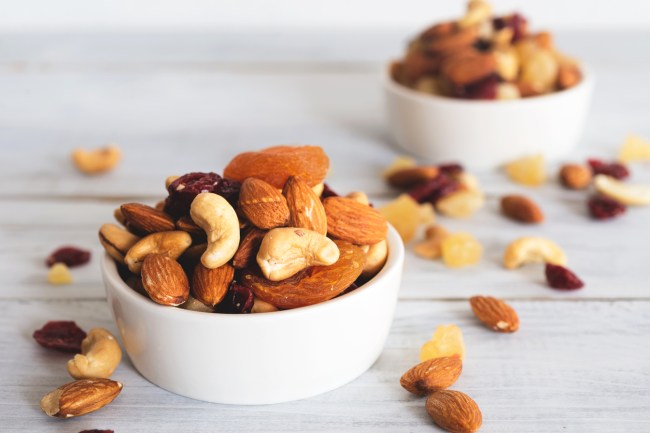
iStockphoto
In a previous article here on BroBible, I talked about the importance of counting your macronutrients if you want to burn fat and build muscle. In the first two installments of this series, we talked about protein and carbs, and the roles each play within the body. In today’s article, we are going to be talking about fats…
Of all the macronutrients, fat is the most energy dense at 9 calories per gram.
For many years, fat was vilified and made out to be the reason for many health problems. The thought was that eating fat = makes you fat. Thankfully, we know now that this is not true, and fat is actually necessary for our bodies to function.
Fat is an essential player when it comes to hormone production, especially testosterone. Fat is also responsible for regulating things like blood pressure, inflammation, vitamin absorption, and assists in brain function.
So unless you have a very specific medical condition, eating a low fat diet doesn’t really make sense. There are four different types of fats: monounsaturated, polyunsaturated, saturated, and trans fats. And with the exception of trans fats, each type of fat performs a specific function in the body.

iStockphoto
Monounsaturated fat: These are fats that are found in things like avocados, walnuts, almonds, and cashews, as well as olive oil. Monounsaturated fats help lower bad cholesterol, raise good cholesterol and can help with fat loss.
Polyunsaturated fat: This is the type of fat that contains omega-3 and omega-6 fatty acids. These are fats that the body cannot produce but are essential to our health. Polyunsaturated fats can be found in things like salmon, fish oil, and seeds.
Saturated fats: Saturated fat is the reason that fats as a whole initially got a bad rap. There where a number of studies (flawed, biased studies) that linked saturated fat to heart disease. However recent research and longer-term studies have shown that not only are saturated fats NOT the cause of heart disease, but that they are actually one of your body’s preferred sources of energy. As long as everything you eat is not swimming in butter, you will be fine
Trans fats: Trans fats are the exception to the fat rule. Most trans fats are artificially made, which means they are not good for you. Trans fats are manufactured by taking normally healthy fats and infusing them with hydrogen atoms. This gives the fat a longer shelf life, but also makes it much worse for you. Trans fats are found in most fried foods, and while eating them every now and again wont kill you, they are something you want to severely limit your consumption of.
Fat Sources
Like we discussed earlier, with the exception of trans fats, there really aren’t any fats you need to avoid.
For a lot of people, a decent portion of their daily fat intake is going to come from their protein sources. If you are eating any type of animal protein, you are going to get some fat from it as well. How much depends on the source. Seafood and poultry are going to contain less fat, while red meat and eggs are going to contain more.
Outside of this, other sources of fats include some dairy products like butter, cream, and cheeses; oils like olive, flaxseed, coconut and fish oil; any kind of nut or seed; and a few veggies like olives and avocados.
Trans fat consumption should be severely limited. Many fast food restaurants and food manufacturers us trans fats in their cooking process because it is so cheap. Thankfully however, as we learn more about the dangers of trans fat consumption, more and more companies are eliminating them altogether.
The big disclaimer with fats is you need to watch your portion sizes. Because fat is so energy dense, it doesn’t take much for the calories to start adding up. This makes fats very easy to overeat, and thus, overshoot your caloric intake for the day. This is true for any macronutrient of course, but because fat provides over double the caloric value of protein or carbs, you need to pay extra attention to how much of it you are consuming.
In the next installment of the Know Your Macros series, we are going to talk about every bros favorite macronutrient, alcohol.